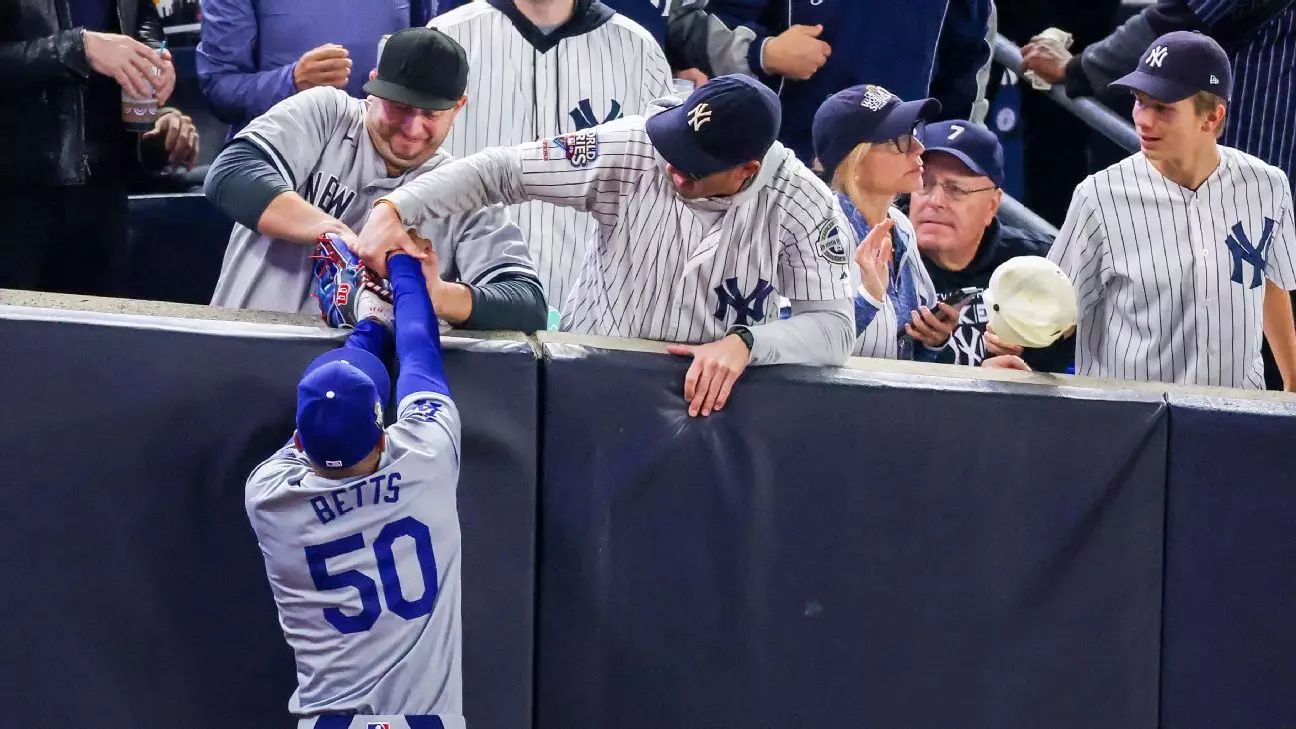Foul Play: A Controversial Moment at the World Series
The World Series has long been a pinnacle of excitement and drama in the world of baseball. Every game is filled with anticipation, and every play can turn into a defining moment. As someone who’s been an ardent follower of baseball, I’ve witnessed my fair share of memorable games. However, nothing prepared me for the unexpected twist that unfolded during Game 4 at Yankee Stadium. It was a night where fans became more than just spectators; they became part of the story.
I remember sitting on the edge of my seat, surrounded by the electric atmosphere that only a live game can offer. The tension was palpable, and as Gleyber Torres hit that pop fly, all eyes were on Mookie Betts. Known for his incredible defensive skills, Betts leapt towards the wall with an agility that left everyone holding their breath. What followed next was an unforeseen interruption that would spark debate and controversy among fans and players alike.
Key Takeaways
- Fan interference during live sports events can significantly impact the game’s outcome.
- Actions taken by fans can lead to discussions about acceptable behavior at sporting venues.
- Professional athletes often display commendable composure in face of unexpected disruptions.
The Dramatic Interference
As Betts reached for the ball, two fans decided to take matters into their own hands. Austin Capobianco, a dedicated Yankees season-ticket holder, decided it was his moment to shine—or interfere, depending on how you see it. Reaching out, he disrupted what could have been another spectacular catch by Betts. Meanwhile, his friend John Peter added to the chaos by grabbing Betts’ other hand. This fan interference led to a pivotal call by the right-field umpire: fan interference was declared, and Torres was called out.

The reaction from those around them was immediate. Some were amused, others outraged. Capobianco later admitted that this brash act stemmed from playful banter he shared with friends about catching foul balls to help their team. But what seemed like harmless fun quickly turned serious as both fans faced ejection from the stadium—a stark reminder of how passion can sometimes blur the lines of acceptable behavior.
Mookie Betts’ Response
Mookie Betts’ reaction in those moments after the incident was one of visible frustration. Yet, true to his reputation as a composed athlete, he chose not to let it overshadow his focus on the game. In post-game interviews, Betts downplayed its significance, stating, “When it comes to the person in play, it doesn’t matter. We lost. It’s irrelevant.” His words reflect a maturity that is often expected but not always seen in high-pressure situations such as these.
Despite his attempts to remain indifferent, one must consider how such disruptions can shift dynamics within a game. At that point in time, the Dodgers were ahead with a two-run lead but eventually succumbed to an 11-4 loss against the Yankees. It’s moments like these that highlight how external factors—even those seemingly insignificant—can influence morale and momentum.
The Ethics of Fan Behavior
This incident has sparked broader conversations surrounding fan conduct at sporting events. While enthusiastic support is undoubtedly part of what makes sports so thrilling, there remains an essential question: where should we draw the line? The actions of Capobianco and Peter suggest a trend where some fans believe their intervention could sway outcomes favorable for their team.

Such incidents serve as important reminders about maintaining sportsmanship within stadiums while enjoying spirited fandom responsibly—without crossing boundaries that affect gameplay integrity or player safety. It compels us all (whether attendees or viewers) towards introspection regarding ethical considerations expected from spectatorship roles too often taken lightly amidst excitement-filled arenas worldwide today!
Final Thoughts
The World Series is more than just a showcase of athletic talent; it’s an arena where human emotions come into play. The ejection of fans like Capobianco and Peter serves as a narrative about sportsmanship and ethics that transcends beyond a single game or series. As we move forward in this thrilling championship journey toward future matches unfolding before us soon enough—it becomes crucial reflecting upon interactions between players themselves alongside passionate audiences filling seats each day anew!
For now though—as both teams regroup after what transpired during Game 4—the Dodgers must grapple emotionally & psychologically dealing unusual circumstances they encountered amidst challenging competition faced thus far leading up next showdown slated shortly thereafter…
World Series fan interference Mookie Betts baseball controversy


Leave a Reply